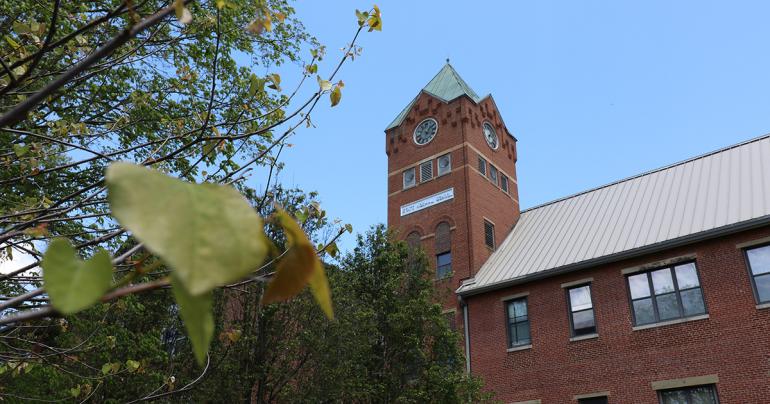
FOR IMMEDIATE RELEASE: October 23, 2020
For More Information:
Glenville State College
Public Relations Department
(304) 462-4115
GLENVILLE, WV - The Glenville State College (GSC) clock tower is an iconic piece of architecture on the scenic Gilmer County campus. It is from that clock tower that the often-used nickname for the institution emerged: the Lighthouse on the Hill.
In 1893, the state legislature agreed to provide funding, around $20,000, to build an addition onto part of what is now known as the Harry B. Heflin Administration Building.
With additional space provided by the new construction to the Administration Building, Glenville State continued to see growth in all aspects, including the student body. By 1897 the famous clock tower was added to the building. When first built, the tower was 20 feet higher than we know it today. The state Board of Regents required it to be shortened around 1904 over fears of it toppling in high winds.
According to archival records from GSC’s Robert F. Kidd Library, it was 1899 before the finished tower was completed with a clock. The original clockworks were made by the E. Howard & Company of Boston, Massachusetts.

In those days, the clock on the tower was operated by two iron weights; one weighing 600 pounds and the other 2,300 pounds. The weights were raised by winding cables on two large drums which were operated by a crank. The clockworks also included an 80-pound pendulum and a 30-inch diameter bell. The bell, it was said, could be heard for nearly two miles when rang on a clear day.
Of course no such clock of the time period could be expected to operate without some human assistance. Enter George Firestone. Firestone, who was a longtime janitor and confidante for students, was entrusted with maintenance of the clockworks and was the official time keeper of the tower for many years. Old stories recall some on campus and in the community wondering if the clock was perhaps a few minutes fast or slow on occasion. But then again, according to an article from the Glenville Mercury in 1931, in Glenville, “what does five or ten minutes matter?”
In the days before cell phones, students, faculty, staff, and community members used the tower chimes to make sure they got to class, work, church, dates, and more on time. Even today, the chimes help keep everyone informed of the hours throughout the day.
Various instruments have provided the hourly notice of the passing day…the original bell, chimes, and computerized speakers. In the 1970s, the chimes being used had become inoperable due to technical issues. Fast forward to 1979 when funds were raised to repair the chimes and to install equipment to amplify the music from a carillon. In those days, daily at 11:50 a.m., songs were played live by a carillon player. Instructors of the day, such as Sidney Tedford and Bertha Olsen, were frequent performers of the various hymns, folk songs, and other popular tunes played on the chimes. Song requests were also happily accepted. These days the chimes heard throughout campus are generated by an electronic carillon produced by the Schulmerich company.
In 2010 the historic bell was removed from the clock tower. In addition to the bell, the original clockworks, including the pendulum, were relocated from the tower and put on display inside Clemons Tower on campus. It was thought that, since the pieces were no longer in service, it would be fitting to showcase them where they could be seen by students and visitors more easily.
Clemons Tower is dedicated to Els Roy Clemons in honor of his years of service at GSC. The building is located between Goodwin Hall and the Mollohan Campus Community Center. Clemons first came to Glenville State as a construction worker in the early 1950s. He was later hired as custodian for the Physical Education Building and would go on to spend time winding and maintaining the tower clock, among his other duties. He was eventually promoted to Assistant Physical Plant Director; he retired in 1993.
Glenville State College has a history spanning back nearly 150 years to its roots as a state normal school. The famous clock tower has been around nearly as long and has become an essential part of the campus. It continues to serve as an icon for its students and alumni.

